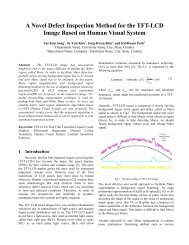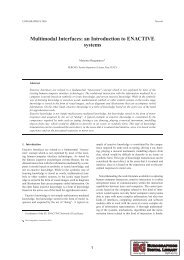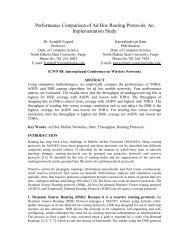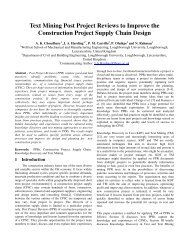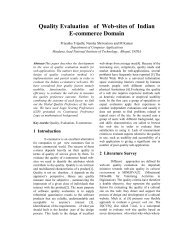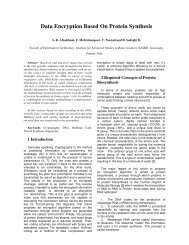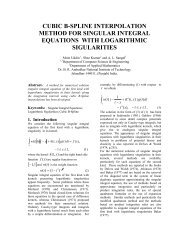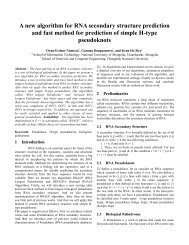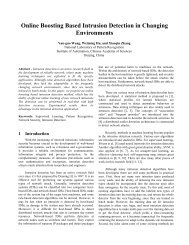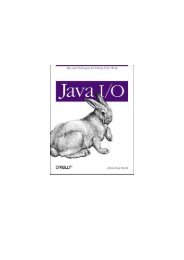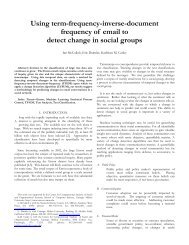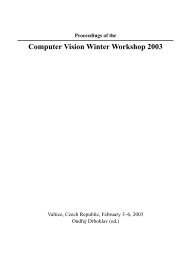O'Reilly - Java Message Service
O'Reilly - Java Message Service
O'Reilly - Java Message Service
Create successful ePaper yourself
Turn your PDF publications into a flip-book with our unique Google optimized e-Paper software.
<strong>Java</strong> <strong>Message</strong> <strong>Service</strong><br />
A message basically has two parts: a header and payload. The header is comprised of<br />
special fields that are used to identify the message, declare attributes of the message, and<br />
provide information for routing. The difference between message types is determined<br />
largely by their payload, i.e., the type of application data the message contains. The<br />
<strong>Message</strong> class, which is the superclass of all message objects, has no payload. It is a<br />
lightweight message that delivers no payload but can serve as a simple event notification.<br />
The other message types have special payloads that determine their type and use:<br />
<strong>Message</strong><br />
This type has no payload. It is useful for simple event notification.<br />
Text<strong>Message</strong><br />
This type carries a java.lang.String as its payload. It is useful for exchanging<br />
simple text messages and also for more complex character data, such as XML<br />
documents.<br />
Object<strong>Message</strong><br />
This type carries a serializable <strong>Java</strong> object as its payload. It's useful for exchanging<br />
<strong>Java</strong> objects.<br />
Bytes<strong>Message</strong><br />
This type carries an array of primitive bytes as its payload. It's useful for exchanging<br />
data in an application's native format, which may not be compatible with other<br />
existing <strong>Message</strong> types. It is also useful where JMS is used purely as a transport<br />
between two systems, and the message payload is opaque to the JMS client.<br />
Stream<strong>Message</strong><br />
This type carries a stream of primitive <strong>Java</strong> types (int, double, char, etc.) as its<br />
payload. It provides a set of convenience methods for mapping a formatted stream of<br />
bytes to <strong>Java</strong> primitives. It's an easy programming model when exchanging primitive<br />
application data in a fixed order.<br />
Map<strong>Message</strong><br />
This type carries a set of name-value pairs as its payload. The payload is similar to a<br />
java.util.Properties object, except the values must be <strong>Java</strong> primitives or their<br />
wrappers. The Map<strong>Message</strong> is useful for delivering keyed data.<br />
2.1.3 Sessions and Threading<br />
The Chat application uses a separate session for the publisher and subscriber, pubSession<br />
and subSession, respectively. This is due to a threading restriction imposed by JMS.<br />
According to the JMS specification, a session may not be operated on by more than one<br />
thread at a time. In our example, two threads of control are active: the default main thread<br />
of the Chat application and the thread that invokes the on<strong>Message</strong>( ) handler. The thread<br />
that invokes the on<strong>Message</strong>( ) handler is owned by the JMS provider. Since the invocation<br />
of the on<strong>Message</strong>( ) handler is asynchronous, it could be called while the main thread is<br />
31



